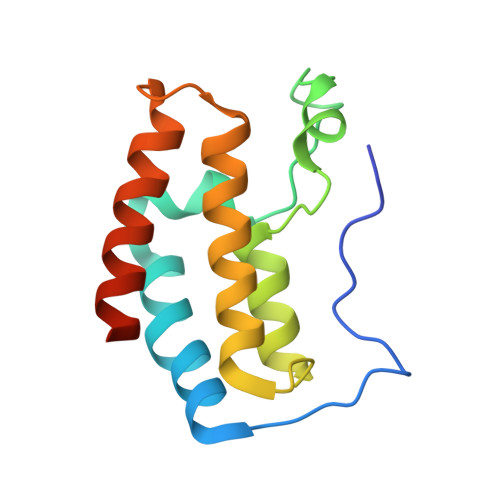BET N-terminal bromodomain inhibition selectively blocks Th17 cell differentiation and ameliorates colitis in mice.
Cheung, K., Lu, G., Sharma, R., Vincek, A., Zhang, R., Plotnikov, A.N., Zhang, F., Zhang, Q., Ju, Y., Hu, Y., Zhao, L., Han, X., Meslamani, J., Xu, F., Jaganathan, A., Shen, T., Zhu, H., Rusinova, E., Zeng, L., Zhou, J., Yang, J., Peng, L., Ohlmeyer, M., Walsh, M.J., Zhang, D.Y., Xiong, H., Zhou, M.M.(2017) Proc Natl Acad Sci U S A 114: 2952-2957
- PubMed: 28265070
- DOI: https://doi.org/10.1073/pnas.1615601114
- Primary Citation of Related Structures:
5ULA - PubMed Abstract:
T-helper 17 (Th17) cells have important functions in adaptor immunity and have also been implicated in inflammatory disorders. The bromodomain and extraterminal domain (BET) family proteins regulate gene transcription during lineage-specific differentiation of naïve CD4 + T cells to produce mature T-helper cells. Inhibition of acetyl-lysine binding of the BET proteins by pan-BET bromodomain (BrD) inhibitors, such as JQ1, broadly affects differentiation of Th17, Th1, and Th2 cells that have distinct immune functions, thus limiting their therapeutic potential. Whether these BET proteins represent viable new epigenetic drug targets for inflammatory disorders has remained an unanswered question. In this study, we report that selective inhibition of the first bromodomain of BET proteins with our newly designed small molecule MS402 inhibits primarily Th17 cell differentiation with a little or almost no effect on Th1 or Th2 and Treg cells. MS402 preferentially renders Brd4 binding to Th17 signature gene loci over those of housekeeping genes and reduces Brd4 recruitment of p-TEFb to phosphorylate and activate RNA polymerase II for transcription elongation. We further show that MS402 prevents and ameliorates T-cell transfer-induced colitis in mice by blocking Th17 cell overdevelopment. Thus, selective pharmacological modulation of individual bromodomains likely represents a strategy for treatment of inflammatory bowel diseases.
Organizational Affiliation:
Department of Pharmacological Sciences, Icahn School of Medicine at Mount Sinai, New York, NY 10029.















